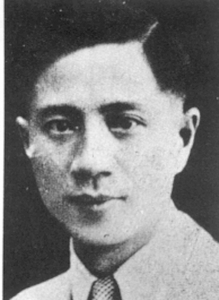Ren Guang on:
[Wikipedia]
[Google]
[Amazon]
 Ren Guang (; November 9, 1900 in
Ren Guang (; November 9, 1900 in
Ren Guang page''Colorful Clouds Chasing the Moon''
An article about 彩雲追月 with three music videos
(Chinese)
(Chinese)
by Hon-Lun Yang
 Ren Guang (; November 9, 1900 in
Ren Guang (; November 9, 1900 in Zhejiang
Zhejiang ( or , ; , also romanized as Chekiang) is an eastern, coastal province of the People's Republic of China. Its capital and largest city is Hangzhou, and other notable cities include Ningbo and Wenzhou. Zhejiang is bordered by Jiang ...
– January 1941), also known by a pen name
A pen name, also called a ''nom de plume'' or a literary double, is a pseudonym (or, in some cases, a variant form of a real name) adopted by an author and printed on the title page or by-line of their works in place of their real name.
A pen na ...
, Ren Qianfa (任前发), was a noted Chinese composer of the early 20th century.
Ren studied in Paris beginning in 1919, and there acquired the techniques of music composition. As a consequence, his works are influenced by Western music, particularly in their harmonic accompaniment. He returned to China and worked at Baidai Record Company.
Among his best-known compositions are ''Rosy Clouds Chasing the Moon'' (彩雲追月, Cǎi Yún Zhuī Yuè), composed in 1935 for Chinese instrumental ensemble and transcribed for piano in 1975, and ''Song of the Fishermen'' (渔光曲, Yú Guāng Qǔ), used as the theme song for a namesake film .
Other films for which he provided songs include ''Kangdi ge'' (Resisting the Enemy), ''Dadi xingjunqu'' (Great World March), ''Yue guangguang'' (Bright, bright moon) and ''Wang laowu'' (Wang Five). He invited the musician Huang Yijun to compose ''The Flowers are Blooming and the Moon is Full'' (花好月圆) which was included on a 1935 recording Ren Guang supervised.
After another research trip to France, where he set up a Chinese choir, he returned home in 1938 to concentrate on anti-Japanese propaganda with the opera ''Hong bo qu'' (Turbulent Waves) and ''Gaoliang hong le'' (the sorghum is red. He went to Southeast Asia in 1939 to assist the National Salvation Movement
The National Salvation Movement (''Movimiento de Salvación Nacional'') is a conservative political party in Colombia, founded by Alvaro Gómez Hurtado in 1990. At the legislative elections held on 10 March 2002, the party, as one of the many sm ...
and in 1940 he worked as composer for the New Fourth Army
The New Fourth Army () was a unit of the National Revolutionary Army of the Republic of China established in 1937. In contrast to most of the National Revolutionary Army, it was controlled by the Chinese Communist Party and not by the ruling Ku ...
, for which he wrote ''Xin Si Jun dongjin qu'' (The New Fourth Army marches east).
He died in the Wannan Incident (also called the New Fourth Army Incident, during the Second Sino-Japanese War
The Second Sino-Japanese War (1937–1945) or War of Resistance (Chinese term) was a military conflict that was primarily waged between the Republic of China and the Empire of Japan. The war made up the Chinese theater of the wider Pacific Th ...
) in Wannan, southern Anhui
Anhui , (; formerly romanized as Anhwei) is a landlocked province of the People's Republic of China, part of the East China region. Its provincial capital and largest city is Hefei. The province is located across the basins of the Yangtze River ...
, in January 1941.
References
External links
Ren Guang page
An article about 彩雲追月 with three music videos
(Chinese)
(Chinese)
by Hon-Lun Yang
See also
*Nie Er
Nie Er (14 February 1912 – 17 July 1935), born Nie Shouxin, courtesy name Ziyi (子義 or 子藝), was a Chinese composer best known for "March of the Volunteers", the national anthem of People's Republic of China. In numerous Shanghai magaz ...
*Lü Ji (composer)
Lü Ji (; 1909 – January 5, 2002), originally named Lü Zhanqing (吕展青; pinyin: Lǚ Zhǎnqīng), was a Chinese composer. He was also a music writer, educator, and administrator.
He was born in Xiangtan, Hunan in 1909 and became interested ...
*Xian Xinghai
Xi'an ( , ; ; Chinese: ), frequently spelled as Xian and also known by other names, is the capital of Shaanxi Province. A sub-provincial city on the Guanzhong Plain, the city is the third most populous city in Western China, after Chongqing ...
* He Lüding
{{DEFAULTSORT:Ren, Guang
Chinese male composers
1900 births
1941 deaths
People from Shengzhou
Republic of China musicians
Musicians from Shaoxing
20th-century composers
Chinese composers
20th-century Chinese musicians
20th-century male musicians